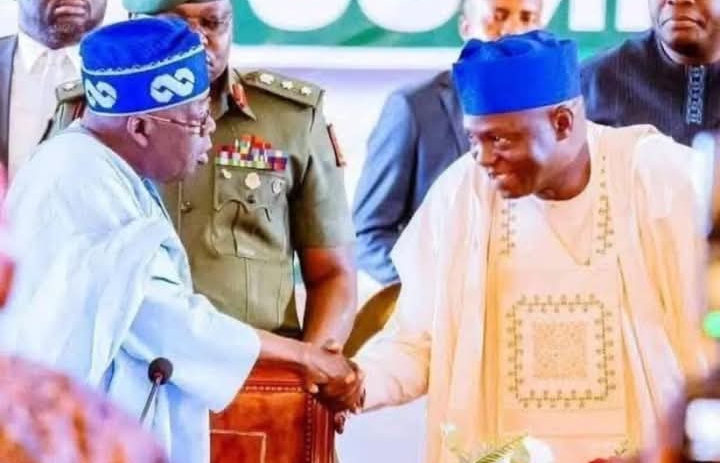The challenge a ruling party has in an election year is to ensure it ticks the right boxes with its members, support its elected leaders to deliver and put its house in order to ensure victory for the party at the general elections.
Whether it was due to his aura or by divine arrangement, the All Progressives Congress (APC) has been receiving high-quality leaders, including governors, senators, House of Representatives members and others, into its fold since Prof. Nentawe Yilwatda Goshwe became the national chairman of the party in July.
With this goodwill, it is obvious that that is not a time to allow internal bellicosity to fester or engender a cantankerous leadership style that scares away party members but one that instills confidence and offers all a sense of belonging.
It is instructive to observe that in Nigeria’s often noisy political arena, where power is announced through rancour to create visibility, the APC national chairman, Professor Nentawe Yilwatda Goshwe, is charting a different path.
Rather than unnecessary noise and an adversarial show of force, Prof. Yiltwada Goshwe has chosen a pattern defined by quiet strategy, discipline, and data-driven reform.
Since assuming office in July, the new national chairman of the All Progressives Congress (APC) has made it clear that he represents a new kind of leadership within the ruling party: deliberate rather than dramatic; technocratic rather than transactional; and motivational rather than spoon-fed.
His task is clear: to steady the party, rebuild its structures, win members and align it with the governance vision of President Bola Ahmed Tinubu ahead of the 2027 general elections.
Born on August 8, 1968, in Dungung, Kanke Local Government Area of Plateau State, Nentawe Yilwatda’s roots are deep in academia and technology. A professor of electrical and electronic engineering, he taught and later served as director of ICT at the Federal University of Agriculture, Makurdi. His career trajectory has long reflected a fascination with systems — how they work, how they fail, and how they can be improved.
Between 2017 and 2021, Yilwatda served as a Resident Electoral Commissioner (REC) with the Independent National Electoral Commission (INEC)—an experience that exposed him to Nigeria’s complex electoral and political systems. That role, more than any other, prepared him for the delicate task of party management.
His leadership qualities pointed him to another calling, and quite naturally, he was called upon to lead his state of Plateau at the highest level.
So he contested for the Plateau State governorship in 2023 on the APC platform, venturing into the field not as a traditional politician but as a technocrat with ideas. Although he did not emerge victorious, his campaign was noted for its civility and focus on policy.
But even at that, his calm demeanour, deep intellect, and reputation for integrity caught the attention of President Tinubu, who later appointed him Minister of Humanitarian Affairs and Poverty Reduction in 2024. In that role, he earned quiet praise for reorganising social welfare schemes and restoring order to a ministry long burdened by controversy.
Yilwatda’s elevation to the APC National Chairman position in July was not a surprise to those familiar with Tinubu’s strategic instincts. The president, who prizes loyalty and competence, found in him a rare combination — a loyal party man and an administrator with a record of effective delivery.
As chairman, Yilwatda has set out to professionalise party operations. His first acts included inspecting the APC’s ICT data centre, meeting state executives, and initiating plans to modernise membership registration through digital systems.
“The APC must become Nigerians’ first-choice party,” he said in his first address to the National Executive Committee (NEC). “Our strength will come from structure, discipline, and service — not slogans.”
That statement reflects the philosophy guiding his leadership: that party reform must be rooted in performance, not propaganda.
For Yilwatda, the APC’s future lies in reconnecting with ordinary Nigerians — especially at the grassroots. His North-Central background provides him a unique vantage point for understanding regional diversity and balance, a recurring challenge in Nigerian politics.
Under his leadership, the APC secretariat has been focusing on grassroots engagement, discipline among members, and data-driven organisation. His approach, according to party insiders, mirrors his years in academia — meticulous, methodical, and patient.
“He is not the kind of leader who shouts,” one senior party official said. “He studies the system, identifies the weaknesses, and fixes them quietly.”
A key aspect of Yilwatda’s mission is to ensure that the APC does not function merely as an election-winning machine but as machinery for ensuring food governance through agenda setting and monitoring and guidance of its elected leaders.
His experience in the humanitarian ministry gives him insight into the government’s social policies and their political implications. He believes that for the APC to retain legitimacy, it must connect the president’s “Renewed Hope” agenda with everyday realities — from poverty reduction to youth empowerment.
“Political strength comes from visible impact,” Yilwatda is said to have told party officials recently. “If people see that government policies are improving their lives, they will trust the party that delivered them.”
This approach aligns with President Tinubu’s strategy of institutional renewal — a move away from personality-driven politics toward systems that endure beyond individual leaders.
Yilwatda’s leadership seems prepared for the challenges ahead. The task of navigating a party full of strong personalities and competing regional interests while maintaining unity and focus. His technocratic style will complement grassroots politics, while his measured temperament has earned him cautious respect across factions.
Observers say his biggest test will come as the 2027 elections draw closer — when the pressure to deliver political results intensifies. Whether his quiet methods can withstand the heat of powerful men, remains to be seen.
Still, his approach appears deliberate. By emphasising order over showmanship, he is slowly reshaping the APC’s internal culture — moving it closer to an institution that prizes discipline, planning, and accountability.
In Abuja’s corridors of power, where loyalty is often noisy, Prof. Yilwatda stands out for his understated confidence. He rarely seeks the spotlight, preferring to work behind the scenes. But those who follow the APC’s inner workings say his influence is already being felt — in calmer meetings, clearer communication lines, and a growing sense of organisation.
For President Tinubu, Yilwatda’s stewardship offers something essential: a stabilising hand at the party’s centre. Through him, the president’s governance priorities — from economic reform to social inclusion — are finding structured political expression.
As Nigeria’s ruling party seeks to renew itself, Nentawe Yilwatda represents a different model of leadership — one that values systems over slogans and quiet strength over noise.
If his steady hand holds, the APC under his watch could not only secure Tinubu’s political legacy but also redefine how political organisations operate in Nigeria—less as instruments of personality and more as vehicles for performance.




